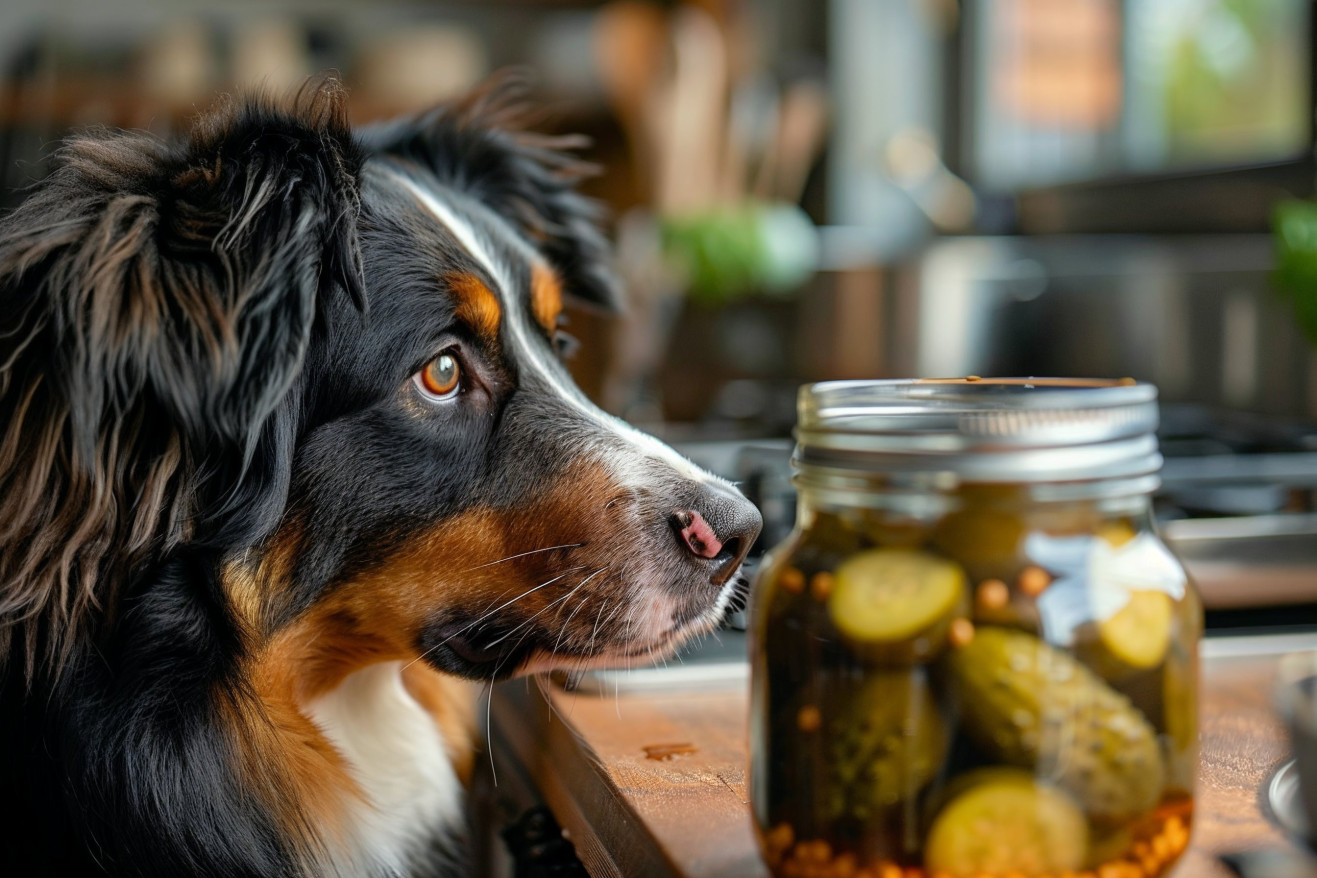Can Dogs Eat Pickles? The Truth About Salty Snacks
10 April 2024 • Updated 9 April 2024

The debate over whether or not to give your dog a taste of your favorite snack is one that rages on between pet owners and professionals. While pickles are not poisonous to dogs, they are high in salt and may contain spices that could cause digestive issues in your furry friend, so it's probably best to avoid giving them to your dog and opt for other healthier vegetable treats instead.
While this is a good general guideline, we'll take a closer look at the nutritional science behind pickles and how they may or may not affect your dog's health. From clinical research to the development of dog food, we'll explore scientific findings that will help you better understand how much of an issue pickles and other salty, brined snacks may be for different types of dogs. This investigation will give you a more complete picture so you can make informed choices when your dog is begging for a bite of your pickle.
Are pickles bad for dogs?
The Hazards of Sodium: How Pickles Can Be Dangerous for Dogs
The high sodium levels in pickles are one of the biggest reasons to be concerned about giving them to dogs. According to MetLife Pet Insurance, the ASPCA says that too much sodium can lead to increased thirst and urination in dogs. Vets say that sodium intake should be watched, especially in dogs with conditions like hypertension that can be made worse by high-sodium foods.
There are several other potential negative impacts of too much sodium in a dog’s diet besides increased thirst and urination. According to Dutch, these include gastrointestinal distress, vomiting, diarrhea, and in the most extreme cases, seizures. DogTime also says that there is a risk of weight gain and other issues associated with too much sodium.
For some dogs, the high sodium content in pickles can be especially dangerous. According to MetLife Pet Insurance, vets say that it’s important to watch a dog’s total sodium intake to avoid dehydration and potential kidney issues that can be caused by too much sodium. It’s important to make sure that your dog is getting a balanced, low-sodium diet, especially if they have any pre-existing health conditions.
Toxic Ingredients: The Hidden Dangers in Pickles for Pups
Pickles often contain ingredients like garlic, onions, and various spices that can be toxic or harmful to dogs. Garlic and onions, which are members of the allium family, can cause anemia and even death in dogs if consumed in large quantities, according to Sundays for Dogs.
Spices and herbs used in pickling, such as dill, mustard seeds, and chili peppers, can also cause digestive issues and other adverse reactions in dogs. Mustard seeds, for example, can cause gastroenteritis (inflammation of the stomach and intestines) in dogs, per Dutch. Meanwhile, the vinegar used in the pickling process can cause gastrointestinal upset and other health problems.
If the brine doesn’t contain any of these toxic ingredients, pickles are still dangerous for dogs because of their high sodium content, which can cause mild to severe symptoms, including vomiting, diarrhea, and seizures, according to Bored Panda. Given the many risks associated with pickles, it’s best to steer clear of feeding them to your dog.
Dill Pickles: A Healthier Alternative or Still Dangerous?
Even though dill pickles are often thought of as a healthier alternative to regular pickles, they still come with some dangers for dogs. As explained by Dogster, dill pickles are made by pickling cucumbers in a brine that typically includes vinegar, salt, and water. While the dill herb itself isn't toxic to dogs, the vinegar and salt in dill pickles can still be harmful.
In addition, Pumpkin points out that the pickling process removes most of the dill's nutritional value, so dogs won't get much, if any, nutritional benefit from this ingredient. Dill pickles can also contain other ingredients that are toxic to dogs, like garlic or onions, which can lead to anemia and other health problems.
For these reasons, vets advise against giving dogs any kind of pickles, including dill pickles, and instead recommend giving dogs fresh, plain cucumbers as a healthier, dog-safe alternative. As pointed out by The Spruce Pets, pre-pickled cucumbers are a much better option because they offer the nutritional benefits of fiber, hydration, and other nutrients without the risks associated with the pickling process.
Other Pickle Products: Relish, Juice, and More
In addition to pickles, other pickle products like relish and pickle juice can be dangerous for dogs. As reported by Dogster, relish often contains onions, as well as other harmful ingredients like high salt, vinegar, and spices. Onions can be especially problematic for dogs, leading to anemia and other health problems if eaten in large amounts.
Pickle juice is also problematic because of its high sodium content, which can result in salt toxicity if ingested in large quantities, according to Four Leaf Rover. The high salt levels in pickle juice can be toxic to dogs, causing issues like vomiting, diarrhea, and even seizures in extreme cases.
Because the risks of pickle products far outweigh the potential benefits, veterinarians recommend against giving them to dogs. As Hepper points out, even small amounts of relish or pickle juice can cause stomach upset, while larger amounts could lead to more serious issues like pancreatitis. Instead, it’s best to feed your dog plain, fresh vegetables as a healthy snack.
If Your Dog Has Eaten Pickles: Signs and Next Steps
While a small amount of pickles may not cause an immediate emergency, it's still important to watch for signs of distress. According to DogTime, signs of pickle toxicity in dogs include vomiting, diarrhea, lethargy, and excessive thirst or urination.
That said, if a dog has eaten a large amount of pickles, especially if the pickles contain toxic ingredients like onion or garlic, it's important to call a vet or the Pet Poison Helpline right away. As BetterPet explains, salt poisoning in dogs is a life-threatening condition, and recovery isn't always guaranteed or immediate. It may be necessary to act fast and seek treatment to avoid more serious complications.
According to The Dodo, if you think your dog has ingested too much salt from eating pickles, the first sign is excessive thirst. Other signs of salt poisoning include dehydration, vomiting, diarrhea, loss of coordination, and seizures. In these cases, a vet will need to administer IV fluids, electrolytes, and any other necessary supportive care.
Healthy Alternatives: Nutritious Snacks for Your Dog
While pickles are off the table, there are a number of healthy alternatives that are safe and nutritious for dogs to eat as snacks. As noted by Rover, plain fresh cucumbers are a good option that can help keep your dog hydrated and provide a satisfying crunch. The article explains that cucumbers also contain a small amount of vitamin A, K, iron, calcium, and magnesium, so they're a healthy addition to your dog's diet.
Other vegetables like carrots, green beans, and sweet potatoes can also be used as low-calorie treats for dogs, according to the American Kennel Club. These whole foods offer nutritional value without the high sodium and potentially harmful substances found in pickles.
Of course, it's important to remember to introduce new snacks in moderation and watch for signs of allergies or other issues, as recommended by Open Farm. However, by giving your dog a range of healthy, dog-safe snacks, you can make sure they get to enjoy delicious treats without the health risks associated with pickles.
Conclusion: Keep Your Dog Away From Pickles
Despite the fact that pickles may seem like a fun and harmless snack, the high sodium content and potential toxic ingredients make them a dangerous choice for dogs. Most veterinarians and pet experts would recommend against giving your dog any kind of pickles, including dill pickles, as well as pickle-related products like relish and pickle juice. Instead, they suggest that pet parents stick to healthier, dog-friendly options like fresh cucumbers, carrots, and other vegetables.
By learning about the risks and making informed decisions, you can ensure that your dog gets a healthy, balanced diet.


